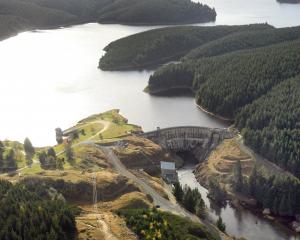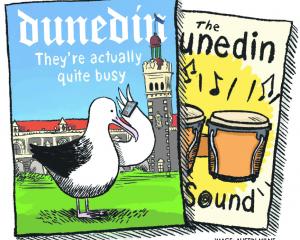
English-born farmer Will Green has taken every opportunity the New Zealand dairy industry has offered — and it has paid off.
Winner of this year’s New Zealand Share Farmer of the Year, representing Canterbury/North Otago, he was previously runner-up in the national dairy manager of the year in 2018.
This week, Mr Green spoke at BrightSIDE, an event held in conjunction with the South Island Dairy Event in Oamaru.
Sponsored by local employers, it was aimed at young farmers and farm team staff who wanted to advance their careers.
Outlining his own career path, Mr Green said he was brought up on a mixed farm in the United Kingdom. Farmed by his family for three generations, they never had ownership as it was part of a large estate.
While he quipped that his mother recalled him wanting to be a jam-maker, for about a two-week period when he was 5 years old, he always wanted to be a farmer, and farm ownership was a key driver for him.
Mad about agriculture, he enjoyed showing livestock and was also sporty and competitive. He was also passionate about communities, and whether it was Young Farmers or performing in a pantomime in a local community show, he would "get stuck in".
Mr Green did not initially want to go to university but his mother gave him a "push in the right direction". That was to prove to be an eye-opener, learning how to learn and meeting great people — as well as having the obligatory fun.
He studied agriculture at Harper Adams University, an agricultural institute, and, as part of that, he got to do a year-long industry placement.
He travelled to New Zealand for the first time in 2009, aged 20, where he spent a year on a sheep and beef farm in Taranaki. He described the experience as one of the best years of his life.
In the UK, farming was very conventional; livestock was housed for six months of the year, calving was all year round and it was "all very full on" without a break.
Working on the more than 2000ha property in Taranaki, which had three staff, he could not believe the scale of it.
Something that stuck with him was seeing how people, not necessarily from farming backgrounds but through hard work, managed to achieve farm ownership.
Mr Green returned to the UK and finished his degree before returning to the family farm. He also did some shearing and contracting work.
But what he had seen in New Zealand left him unsettled. Previously, he had thought his dream of farm ownership was not achievable.
So in September, 2014, he returned to New Zealand, with $20,000 to his name, ostensibly for six months — "that’s what I told my mother".
Knowing he wanted to focus on a pasture-based system, he cold-called Fairlie dairy farmers Kieran and Leonie Guiney who had attended a conference in the UK.
He asked if they had a job and, while they did not have a vacancy at that time, they took him on anyway. He liked their farming philosophy and the fact they were self-made.
He started work as a farm assistant on an 840 cow farm but, by chance, the farm manager left, and he was given the opportunity to take the position, effectively doubling his salary overnight. He was thrown in the deep end but it was a great learning experience, he said.
Mr Green had clear targets; he knew he wanted herd ownership — he had a goal of milking his own cows by the time he was 30 — and he made sure he upskilled himself so he could get into an opportunity to increase his income and keep pushing his way up the ladder. Any opportunities that arose, he took, and he did not waste money.
He was in Fairlie for six years before moving to work for Dairy Holdings at Hinds. He is now a 34% sharemilker on a 270ha property milking 1100 cows and he owns 90% of the herd. For next season, his 12 month goal was to get into whole herd ownership.
While Mr Green described himself as sporty and competitive, his partner Sally Eames was more into theatre and arts and crafts and the couple complemented each other well.
She worked off-farm but enjoyed getting stuck in at weekends. The couple shared a goal of buying their own farm and building a family home in a desired location.
Mr Green’s learnings through playing sport was something that he used in the workplace as he endeavoured to build team culture through those learnings.
When it came to recruitment, they looked for the best people to complement their team rather than the best individual, and Mr Green and Ms Eames were not afraid to roll their sleeves up and do dirty jobs themselves.
He took real pride in the great relationships they had with staff in the workplace and they also did "extra" things, like taking them rafting.
They had an on-farm five-aside soccer team, which played in a competition in Ashburton, and staff also played touch.
That was all about getting them involved in the local community.
As to why Mr Green had chosen to stay in New Zealand — his two younger sisters were both farming in the UK and his parents continued to farm there — he said there was a fantastic grass growing climate which was, by far, the cheapest method of producing protein.
It had a strong co-operative, in Fonterra, and fantastic infrastructure and a clear progression ladder. There were huge numbers of role models achieving farm ownership and so many "awesome" careers in the industry.
The positivity and enthusiasm in the industry "‘rubs off on you" and he loved working on farm, with animals, and with people.
Very goal focused, Mr Green encouraged those attending BrightSIDE to write their goals down, and share them with others, to help keep them accountable.
He was "pretty chuffed" with his success in the dairy industry awards, saying as well as helping build profile, going through the procedures done on farm and "the little things" was great self-evaluation and provided an opportunity to identify weaknesses.
It was a great opportunity to upskill yourself and, by doing that, you had those skills for the rest of your career, he said.













